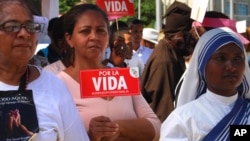A decision this week by the Dominican Republic's constitutional court to reinstate a total ban on abortion is putting women's lives at risk, rights groups said.
Last year, reforms to amend the country's criminal code to allow abortion in cases of rape, incest, a deformed fetus or when a woman's life is in danger, were passed by congress and approved by President Danilo Medina. The reforms, a result of years of debate over the abortion ban in the predominantly Catholic and socially conservative Caribbean country, were set to take effect on December 27.
But after an appeal by religious and conservative groups who said the country's laws and constitution must protect the rights of an unborn child at all costs, the court on Wednesday ruled that changes to the criminal code dating back to 1884 were unconstitutional.
"This decision takes women's and girls' human rights back to the 19th century," Erika Guevara, Americas director at Amnesty International, said in a statement Thursday.
"Its impact will be catastrophic for women and girls in the Dominican Republic who will continue to be criminalized, stigmatized and forced to seek out unsafe abortions because they are denied access to safe and legal medical treatment."
Bishops from the country's influential Roman Catholic Church have publicly criticized moves to overturn the abortion ban.
Rights groups say blanket bans on abortion are a leading cause of maternal mortality because they force women to undergo dangerous backstreet abortions.
Sergia Galvan, spokeswoman for local rights group, the Women and Health Collective, said the court's decision "continues to place Dominican women, even those who long to be mothers, in a dilemma – to die or go to jail – when they require health services, such as abortion".
The Dominican Republic's absolute ban on abortion has led to more than 90,000 unsafe abortions occurring in the country each year, according to the U.S.-based Center for Reproductive Rights.
Other countries in Latin America and the Caribbean that completely ban abortion with no explicit exceptions include Chile, El Salvador, Suriname, Honduras and Nicaragua, according to the center.
(This report was prepared by the Thomson Reuters Foundation, the charitable arm of Thomson Reuters, covering humanitarian news, women's rights, trafficking, corruption and climate change. Visit www.trust.org)









